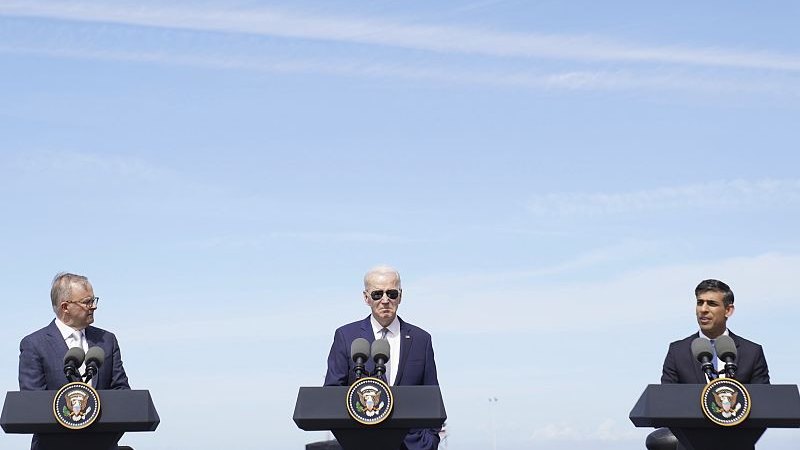
Britain's Prime Minister Rishi Sunak (R) meets with U.S. President Joe Biden (M) and Prime Minister of Australia Anthony Albanese (L) at Point Loma naval base in San Diego, U.S., March 13, 2023. /CFP
Britain's Prime Minister Rishi Sunak (R) meets with U.S. President Joe Biden (M) and Prime Minister of Australia Anthony Albanese (L) at Point Loma naval base in San Diego, U.S., March 13, 2023. /CFP
Editor's note: Hannan Hussain is a foreign affairs commentator, author, and assistant research associate at the Islamabad Policy Research Institute. The article reflects the author's opinions, and not necessarily the views of CGTN.
In a bid to propel an arms race, leaders of Australia, the United Kingdom, and the U.S. recently unveiled a multidecade plan to supply a new fleet of nuclear-powered submarines to Canberra. The nuclear proliferation push, billed by U.S. President Joe Biden as a win for "democracies," is an attempt to escalate nuclear stability risks in the Asia-Pacific, while violating the crux of the Non-Proliferation Treaty (NPT). "Forging this partnership, we're showing again how democracies can deliver our own security and prosperity, and not just for us but for the entire world," said Joe Biden at a naval base in San Diego. The deal's failure to address international concerns on critical safeguards, and its advancement of destructive weapons-grade uranium transfers, is a threat to the sanctity of the non-proliferation regime in plain sight.
Consider the agreement's activation of a nuclear submarine "loophole" to promote selective conformity to global arms control standards. It focuses on sidestepping international oversight of key nuclear capability inputs, effectively feeding fears of an arms race and denying alignment with hard-set International Atomic Energy Agency (IAEA) monitoring standards. Many within the international community are correct to oppose a plan that backs a false sense of security for AUKUS partners in open shores, all at the expense of nonnuclear states and a future without zero-sum arms proliferation.
Loud rhetoric about the AUKUS deal benefiting the "rules-based international order" and "collective undersea presence" ignores a fundamental fact: It is not the alliance's call to make. Instead, Asia-Pacific powers will determine the contours of their own security. The AUKUS alliance faces an uphill task marketing the deal as regionally viable, particularly when the IAEA has flagged a host of legal obligations, and made it clear that "no proliferation risks" must be tied to it.
Ironically, billions in predetermined support for conventionally-armed, nuclear-powered submarines carry all the markings of a flagrant violation of nonproliferation objectives. It's reflected in the planned supply of more lethal, fast-attacking U.S. submarines to Australia, alongside next generation successors. Note that all these provocative proposals arrive without joint scrutiny from all of the IAEA's member states.
History reminds us that key nonproliferation advocates have called out the AUKUS' resistance to submarine safeguard concerns, and thwarted its attempts to coerce IAEA for a unilateral advantage. "Pending the consensus reached by all IAEA member states, the U.S., the UK and Australia should not proceed with relevant cooperation," warned the Chinese Foreign Ministry on March 14.

National flags of Australia, the UK and the U.S. /CFP
National flags of Australia, the UK and the U.S. /CFP
With the same international concerns left outstanding, there is no doubt that the deal will raise the specter of arms proliferation, damage strategic deterrence in the Asia-Pacific, and add a cold-war ring to "security and stability" for all.
Interestingly from the outset, the build-up to the AUKUS deal was seen as a dangerous mix of zero-sum power projection and unwarranted nuclear escalation risks in peaceful waters. Monday's nuclear submarine plan goes a step further: It firmly establishes the alliance's objectives as detrimental to strategic stability in the Asia-Pacific. From outsized emphasis on nuclear-tipped submarines to challenging the IAEA's monitoring and inspection authority, the deal abuses the concept of regional "benefit" to prey on aspirations for common security. It is here that the deal's operationalization faces more headwinds than what leaders could ever admit. For instance, supplies of any nuclear-tipped submarines are unlikely to stick internationally and this in turn could amplify calls to bring the AUKUS deal and its NPT violations under standard scrutiny, and deny a negative precedent for nuclear proliferation to gather any steam in the Asia-Pacific.
Taken together, the region's status as a fast-changing and dynamic part of the world demands preservation of strategic stability through credible, negotiated consensus. At the heart of it lies zero tolerance towards flagrant NPT violations. The AUKUS submarine deal attempts to disrupt such a balance with an iron fist and legitimize NPT violations, cementing the case for a clear reckoning.
(If you want to contribute and have specific expertise, please contact us at opinions@cgtn.com. Follow @thouse_opinions on Twitter to discover the latest commentaries in the CGTN Opinion Section.)